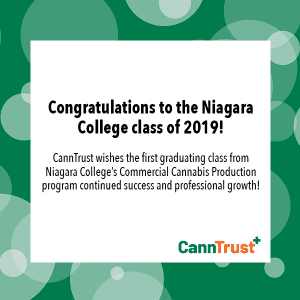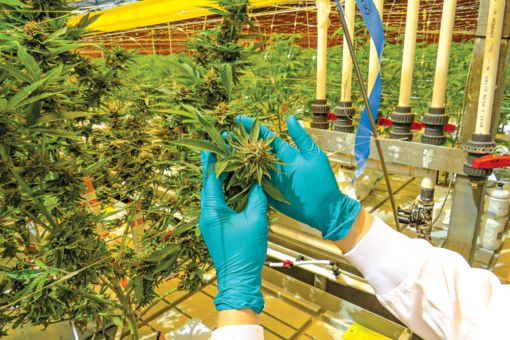The $50 million dollar tour
BY DAVE BURKET Voice PublisherEdward Bernays, a nephew of Sigmund Freud, coined the term “public relations” in the early 1920s. According to a biographer, “Bernays liked to think of himself as a kind of psychoanalyst to troubled corporations.”
CannTrust, the cannabis producer whose Fenwick operation has troubled areas of the town with its odours, invited the Voice to take a tour last week. More specifically, its public relations firm (“Canada’s Most Award-Winning PR Agency”) handled the invite, and chaperoned the visit. Our freelancer Kathryn Hrycusko and I were taken on a nearly two-hour walkabout inside the Balfour Street plant, led by a polite and well-informed “Cultivation Control Specialist." With us were a representative from the PR firm, as well as CannTrust’s Manager of Public Relations and Communications.

 There’s no denying the technical impressiveness of CannTrust's large-scale operation. As Pelham employers go, it sits at the top, with 355 employees and another 250 to be added by the end of 2020. By contrast, Willowbrook Nurseries, once the largest employer in town, has 210 employees at peak season; Fonthill Sobeys has 130 year-round; and the Town of Pelham has 67 full-timers, plus part-timers as needed.
There’s no denying the technical impressiveness of CannTrust's large-scale operation. As Pelham employers go, it sits at the top, with 355 employees and another 250 to be added by the end of 2020. By contrast, Willowbrook Nurseries, once the largest employer in town, has 210 employees at peak season; Fonthill Sobeys has 130 year-round; and the Town of Pelham has 67 full-timers, plus part-timers as needed.
However, after being pressed for an answer for several weeks, CannTrust finally acknowledged over the weekend that only 26 of its 355 workers reside in Pelham. Yes, Niagara needs employment, but any assertion that CannTrust brings jobs to Pelham is more accurately phrased, “CannTrust brings workers to Pelham.”
As for the chronic odour that has plagued neighbours and parts of the wider town since the facility’s opening, we seemed to be told on the tour that new odour-control technology for the existing greenhouses would be coming soon. Yet, in answer to a follow-up question on the issue, it seems not. “CannTrust recently implemented new odour mitigation solvents which have proved to be very successful,” replied the PR firm, adding that a new 390,000 square foot greenhouse to be built next door “will be even more efficient in scrubbing the air as it will utilize fewer air exchanges. This means that the air will be vented less often.”
Public Relations isn’t so much the art of lying as it is the art of selective truth-telling in the service of manipulating perception. Imply often enough, for example, with equivocal phrasing, that an odour isn’t a problem, and maybe we’ll stop smelling it.

Since our visit was not on a “harvest day,” the odour outside the plant last week was noticeable but not overwhelming. Inside was a different story. Twelve hours later I was still smelling ripe cannabis bud. CannTrust calls its Fenwick operation a “Perpetual Harvest Greenhouse Facility,” and is already close to its goal of harvesting every day of the year.
The tour ended in a large vault containing dozens of stacked totes of cannabis, ready to ship to Vaughan for packaging. Total value? $50 million-plus. (Not $5 million. $50 million.)
Asked later to confirm production numbers, the PR firm asserted that by the end of next year, the facility is set to produce 100,000 kg of cannabis annually, with an average value of $10 per gram.
That works out to about $20 million dollars worth of product per week. Let that sink in.
$20 million per week. That’s $1 billion dollars worth of cannabis per year.
$1 billion every year, all coming from the corner of Highway 20 and Balfour Street, in little Fenwick, Ontario.
Can the company therefore afford to install effective odour elimination? Let’s do some math.
We were told that entry-level workers start at $16 hourly. Let’s flash forward to next year, at 600 staff, not all of whom are full-time, but let’s be conservative and say they are. Let’s also double the average salary to $32 per hour. That’s $40 million dollars in annual payroll—again, almost certainly a significant overestimate.
Even at $40 million in annual payroll, this puts $960 million dollars in revenue, each year, into CannTrust’s coffers, from a single location in Fenwick. Mind-boggling, eh.
Yes, there are other costs of production that eat into this revenue—and one of them should be the total elimination of offensive odours leaving the factory.
Even if the cost of doing so was, say, $20 million dollars, that's just a single week's worth of cannabis output.
And if CannTrust can’t manage this because it’s the ethical thing to do, then the Town, Region, province, or federal government must step in with legislation to make it the legal thing to do.
Try as it might, not even Canada’s most award-winning PR agency can persuade Pelham to love CannTrust while the odour of dead skunk still hangs in the air. ♦


